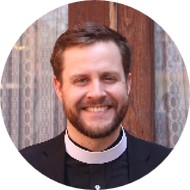Course Syllabus
The St. Paul’s Team
We are excited to introduce you to our creative team for St Paul’s House of Formation. Please reach out to any of us with questions or feedback.

Director of Formation: Fr. Stephen Gauthier is the Canon Theologian of the Diocese of the Upper Midwest and the man who will be teaching you through lectures, and question and answer. You will be able to interact directly with Fr. Stephen via video call on our live webinars (see semester calendar for dates).

Program Director: Fr. Alex Wilgus oversees recruiting, video production, and webinars. He can answer any questions around the entry process, video quality and formatting, or webinar content and accessibility. Reach out to him at awilgus@saintpaulshouseofformation.com

Program Coordinator: Danny Linton provides website, content, and cohort support. He can answer any questions around technical issues you may have about classroom posts and due dates, content issues, or cohort development. He will also be showing you how to pay your Student Investment Fee and processing applications for scholarships — including payment amounts, methods, and due dates. Reach out to him at dlinton@saintpaulshouseofformation.com
The St. Paul’s Classroom
Once you enroll in a St. Paul’s course, you’ll receive access to your own unique online classroom, where you can find everything you need for the semester.
The spring and fall semesters follow the classic model especially designed to fit with your schedule. This term will include one lesson every week for 14 weeks (with a traditional spring or fall break in the center) rather than the summer intensive pattern of two lessons every week for 7 weeks, but all the same material is covered. The content will release each Sunday, beginning with the classroom launch date of 8/21.
You should expect this spring term of St. Paul’s to take about 2-4 hours per week rather than the intensive 3-6. For more information about our intensive and traditional learning models, see our upcoming semesters page.
Cohorts, Calendar, & Due Dates
Cohorts are small learning communities at the heart of Saint Paul’s House of Formation. All students enrolled in St. Paul’s will also be enrolled in a cohort, either local or online, with whom they will process the curriculum as they progress through the semesters. Cohorts will gather weekly to discuss and digest what they are learning and how it shapes their on-the-ground ministry. (See Group Discussion below.) We highly encourage cohort leaders to integrate prayer into their weekly cohort rhythm in a substantive and meaningful way that works for their cohort size, time, and context.
Ideally, cohorts gather weekly, but the priority is that each group develops a rhythm that works for them and sticks to it. We recognize that means all cohorts may not actually launch during the first week of the semester. Don’t worry if you’re a lecture behind; we’re flexible on due dates. But do try to have all course content viewed and assignments completed in a timely and consistent fashion. The course calendar (the next topic in your student portal) will give you the default timeline; If you need help or suggestions on how this affects you or your cohort, reach out to Danny Linton.
Although we know you may not be able to attend every time your cohort gathers, you will need to attend a minimum of 50% of the group sessions in order to pass the semester. If you don’t think that’s feasible for you, just let us know on the front end, and we can develop an alternative plan for your learning.
The St. Paul’s Content
There are 4 types of weekly content, and 2 types of “monthly” content. Each type serves a unique role in helping you engage and absorb the teachings.
The Weekly Content
1. Video Lecture + Outline
- The video lecture is the core of each session, so you’ll want to watch it first. Whenever possible, plan to watch each video in one sitting.
- Use the outline to track with Fr. Stephen’s video lecture. As you scroll, the video will shrink and float over the notes so you can view them simultaneously. To help keep you in sync, the video will show a number in the bottom right corner when Fr. Stephen changes slides.
- If you wish to enlarge the video, you can download the outline as a PowerPoint or PDF file from the “Materials” tab and view it in a separate window instead. There is not an external method to find the video, though; you can only view it from inside the SPHF Classroom.
2. Self-Quiz
- The self-quiz helps you recap some of the highlights from the teaching.
- Each teaching ends with 5-10 comprehension questions. Pause the video before they begin, take the quiz to see what you understood, and then resume play to hear the explanations.
- The multiple choice quizzes are auto-graded. Those grades are mainly meant to help you notice any incorrect answers, and are not individually reviewed by the SPHF team. We will look at the aggregate answers to each question, though, to gauge how clear the teaching and quizzes are on each point.
- The short answer quizzes will not receive either an immediate auto-grade or a manual one later. However, the video lecture will review the correct answers, and any further questions can be brought up in your cohort discussion, or during the monthly Q&A.
3. Group Discussion
- The discussion guide offers insightful ways to explore the content further with your cohort, both by reviewing the material and responding to it personally. Each cohort can decide how they would like to use it.
- For some groups, working through the discussion guide piece by piece will make for the best cohort experience, as it helps to recall the key points and prompt conversation on various fronts. Your cohort leader will have an answer key we provide them in case the group gets stuck. These groups should be sure to plan additional time for discussing other insights or questions not in the guide.
- For most groups, the discussion guide serves best as a reference point for the cohort members to review beforehand, so each person can jot down anything they’d like to discuss further, and the conversation can be more organic throughout.
4. Readings
- The readings give you key primary source material to peruse on your own during the week.
- These longer passages are the only “homework” in SPHF, and are never fluff. That’s why they won’t occur every week, and will vary in length. So if a given week has a readings doc, briefly check its length, and then schedule between ½ – 2 hours accordingly to finish them.
If you would like a personal electronic copy of the outline, discussion guide, or readings, simply click on the “Materials” tab at the top of the lesson, and choose which file you want to download. The quizzes & videos cannot be downloaded.
The “Monthly” Content
1. Exams
- The exams are designed to solidify your long-term memory of the most crucial points and to help you to grow. So they are brief, have no time limit, only cover key issues, and are open notes, video, etc. You will need to open 2 separate browser tabs in order to peruse the material and take the exam simultaneously.
- Each session fits into 1 of the 5 SPHF categories — Scripture, theology, liturgy, patristics, and church history / Anglicanism — and each exam covers the teachings for 1 full category. You must complete all the exams in every semester to earn your SPHF Certificate.
- After the St. Paul’s team grades and returns your exam, look over any incorrect answers as well as any comments you received. If anything doesn’t make sense, feel free to ask us for more feedback, or bring it up in the Q&A webinar.
- Although SPHF isn’t strictly concerned with grades, we do want to make sure the content is being understood. Any grade above 50% is considered a pass, and anything 50% or below is considered a fail. No one will fail a semester merely because they failed an exam, but if someone fails 2 exams, we’ll check in to see if we can identify where the disconnect is, and how we can help the learning process from that point forward.
- Any feedback on essay questions will be sent to your registered email address. You can find all your quiz results, including feedback, on the my classroom page by clicking the down arrow on the right side of the relevant course:

2. Webinars
- The webinars are a direct line to Father Stephen for all your burning theological questions.
- We have 4 webinars for the semester which are hosted outside the student portal (on Zoom) and scheduled in the evenings to avoid work conflicts. Mark your calendars, and when the day approaches, we will send you an email with a link to join the video call. Follow the link at the scheduled time to join in.
- Wednesday, February 7 at 7:30pm, CST
- Wednesday, February 28 at 7:30pm, CST
- Wednesday, April 3 at 7:30pm, CST
- Wednesday, April 24 at 7:30pm, CST
- To prepare for the calls, collect your 1-3 biggest questions from SPHF so far, and email them to us in advance. Once you join the call, submit any questions you have into the chat feed, and be ready to ask them live. We try to take one question per person in the order they appear in the chat, and will supplement them with additional chatted and emailed questions.
The Student Investment Fee
Fee per semester
- Standard — $300
- Spouse Discount — $450 for 2 people (for married couples only)
- Beta Discount — $150 (for those who participated in the SPHF prototype in fall 2017 – spring 2018)
- Returning Leader Discount — free (for those leading a cohort through a semester they’ve completed)
Due Dates
- Scholarship application — T, January 9
- Tuition payment (no scholarship) — T, January 9
- Classroom opens — W, January 10
- Start of semester — Su, January 14
- Tuition payment (if requesting scholarship) — Th, January 18
Scholarship & Payment Process
1. General Registration
- Registration for spring 2024 is now open!
- New students: In order to begin your first semester of St. Paul’s, new students will need to fill out the application form on our website. At the end of the application, you will be prompted to choose one of the two next steps.
- Returning students: You will choose your desired semester via the button at the bottom of the my classroom page.
2. Financial Aid Request
- If you would like to apply for a partial scholarship for the cost of the semester, you will need to fill out our scholarship application form.
- Some partial scholarships are available, but the amount offered depends on the number of people requesting aid, the number of donors offsetting student fee costs, and the reasons for need given. We give as many scholarships as we can, but everyone who applies for a scholarship may not receive one.
- Once we determine your scholarship offer, you will need to purchase the semester from the my classroom page with the coupon code we provide.
3. Payment Process
- If you would like to pay directly, you will proceed to a checkout page. As soon as your payment is successfully processed, you will receive an email confirmation of your enrollment.
- If you proceeded to checkout, but left the page without paying, you can return directly to the checkout page to pay. If you no longer have any items in your cart, you can re-add them from the button at the bottom of the my classroom page.
- We cannot generally process alternative payment methods. The main exception is for churches who are covering the cost for their parishioners / staff. Also, Greenhouse mission staff may use a direct transfer from a ministry account. For either case, just email Danny and he will guide you through the process. Feel free to close the checkout page on the website.
- Once the new semester begins, all paid students will gain access to a personal student portal, where the content for the semester will be released weekly.
